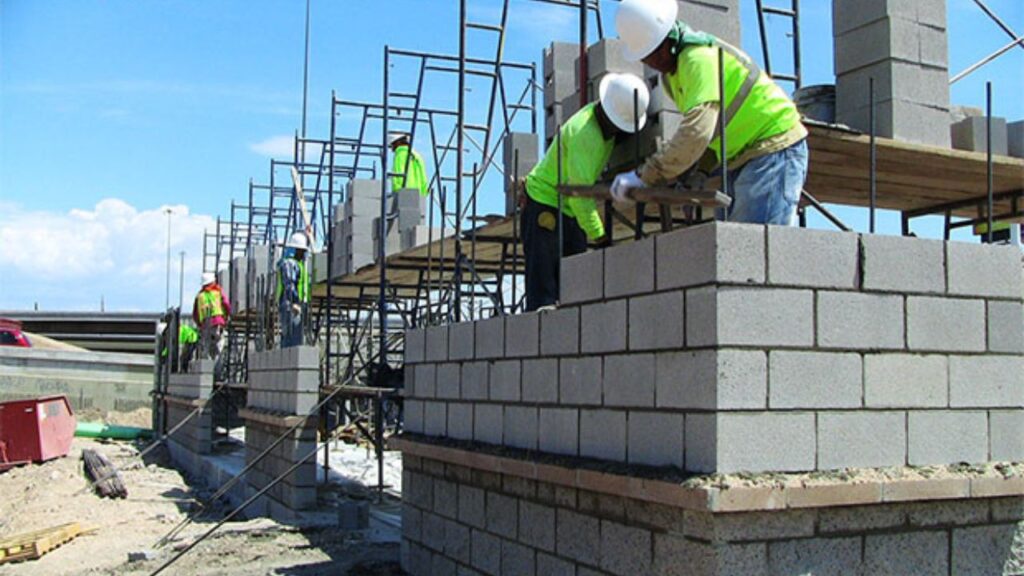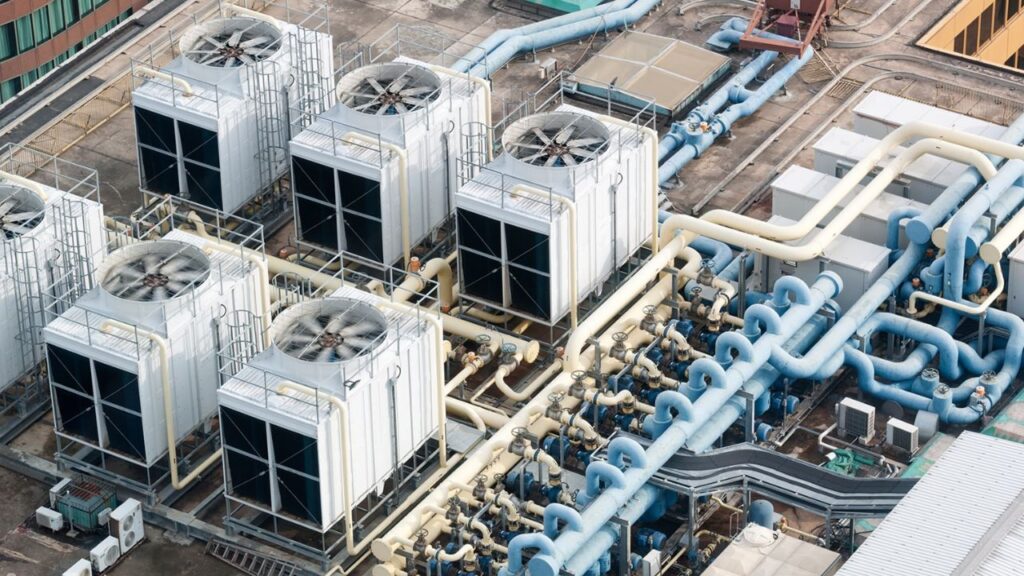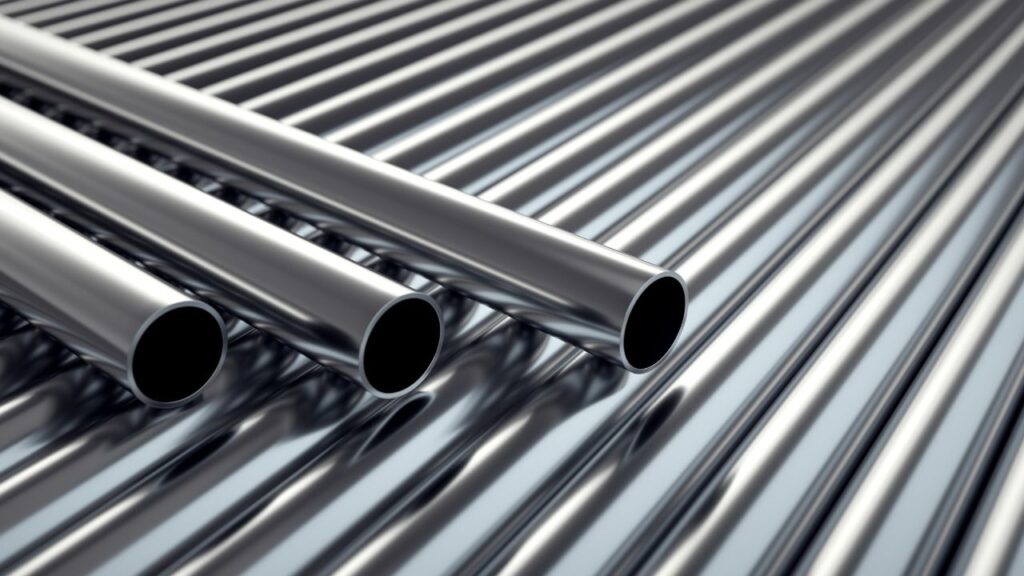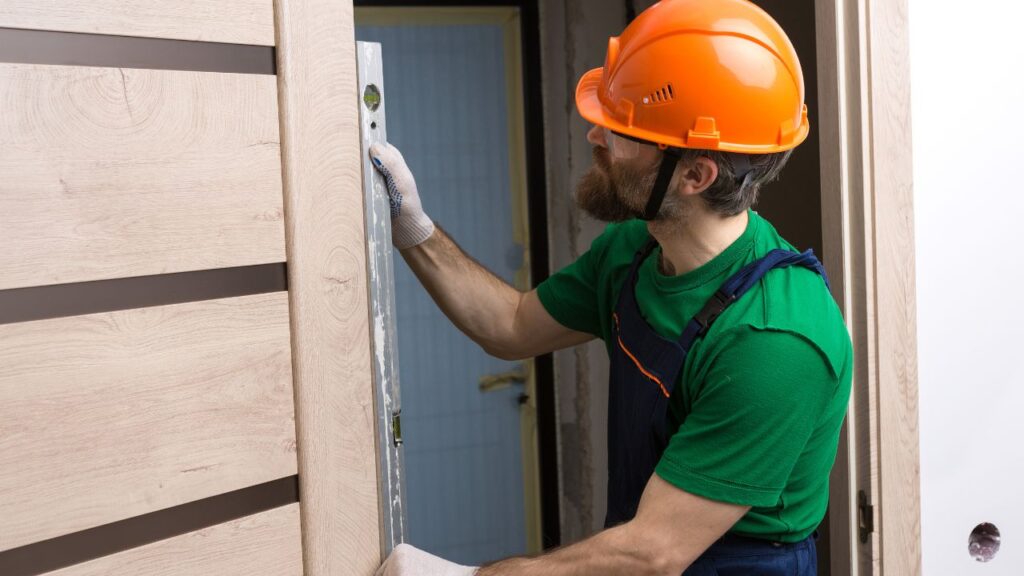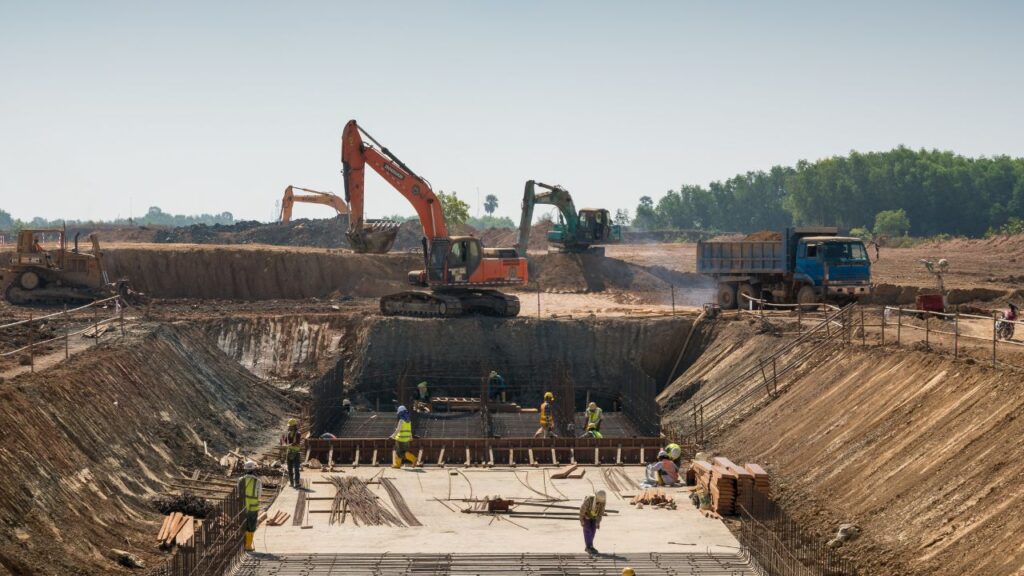Hiring a plumber typically costs between $210 and $540, with most professionals billing by the hour. Hourly rates range from $55 to $240, depending on the complexity of the job and location. Labor usually represents the largest expense in plumbing projects. Tasks that require extensive labor, such as tearing up flooring or breaking through walls, significantly increase the cost. Complex repairs or emergency calls also add to the final bill.
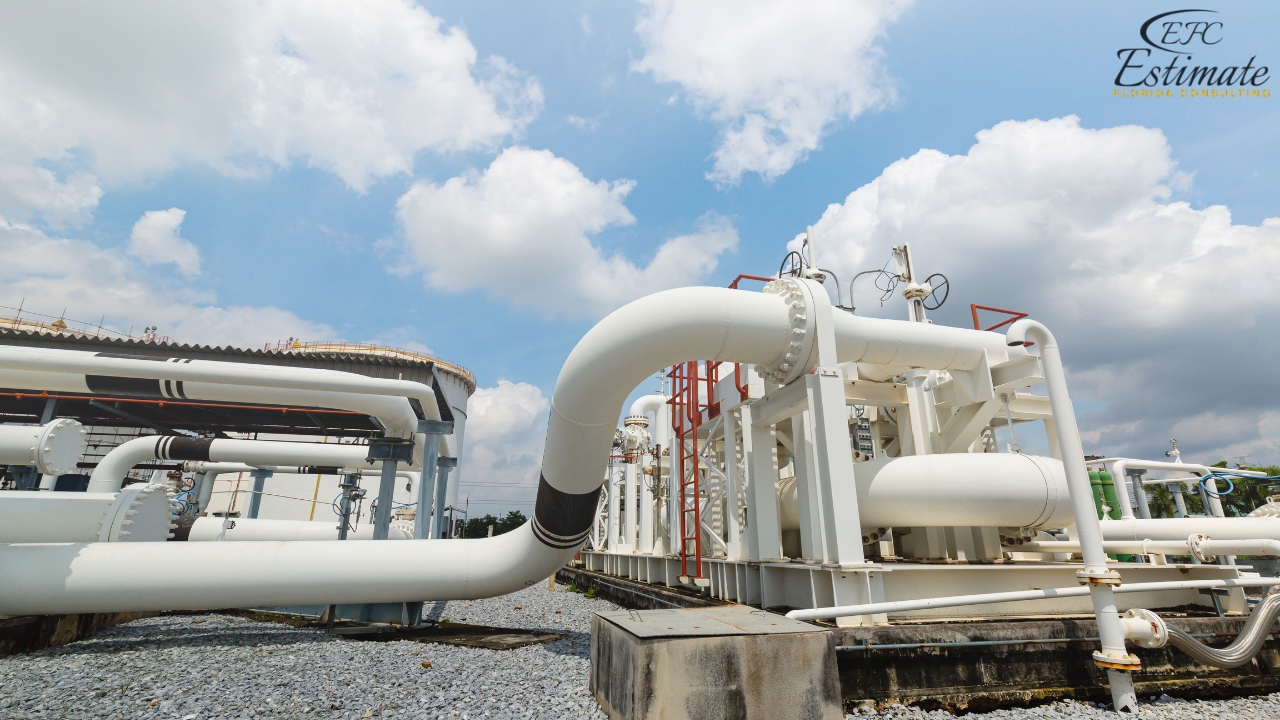
Slab Leak Repair Costs
Detecting a leak under a slab foundation costs between $150 and $480, requiring specialized equipment like infrared cameras and acoustic sensors. Fixing the leak itself ranges from $600 to $4,800, with final costs influenced by factors like:
- The thickness of the slab
- Depth of the leaking pipe
- The type of flooring removed and replaced
- Removal of rebar or vapor barriers
Slab leaks are particularly invasive to fix. The process involves removing flooring, breaking through the slab using jackhammers, accessing the leaking pipe, and then repairing or replacing it. After the pipe is fixed, the slab and flooring must be restored. Always seek quotes from licensed plumbers for accurate estimates, as each job varies widely based on the home’s layout and materials.
Fixing Leaking or Burst Pipes
Repairing leaking pipes averages $180 to $420, with an additional $120 for pinpointing the exact location of the leak. These costs don’t include post-repair work like patching drywall, which can add $300 to $900 based on the size and location of the damage.
If a pipe bursts, expect repair costs to climb significantly, ranging from $1,200 to $4,800. Frozen pipes are a common culprit, often requiring not only pipe replacement but also insulation or heating system improvements to prevent future occurrences. Water damage restoration costs can also escalate depending on the extent of the flooding.
Gas vs. Water Leak Repairs
Repairing gas pipes is generally more expensive than water pipes, with costs ranging from $300 to $900. Gas lines require additional safety measures, testing, and certifications, which accounts for the higher price. Plumbers are trained to handle both water and gas pipe repairs, but gas leaks often necessitate emergency response to ensure household safety.
Cost of Repairing Pipes in Ceilings
Repairing pipes located in ceilings involves additional complexities like cutting into walls or flooring. Ceiling pipe repairs cost an average of $810, factoring in plumbing and the necessary reconstruction work. Jobs requiring pipe replacements or addressing water damage to the ceiling may lead to higher expenses.
Main Line Leak Repair Costs
Repairing leaks in the main water line can cost anywhere from $360 to $4,800, depending on the extent of the damage. The average repair cost hovers around $900, while full replacement of the main water line averages $1,800. Costs are influenced by factors such as access, line depth, and regulatory requirements. Regular maintenance and prompt attention to leaks can prevent costly damage.
Clearing Drain Clogs
Clearing clogs in sinks, bathtubs, toilets, or garbage disposals costs about $240 on average. Clogs are one of the most frequent plumbing issues and can often be resolved with basic tools like plungers. However, stubborn clogs may require a professional plumber equipped with specialized tools.
For garbage disposals, proper use can prevent frequent clogs. Avoid placing fibrous foods like celery, starchy items, or grease down the disposal. If a disposal becomes jammed, consult the user manual for troubleshooting tips, but always unplug the unit before attempting any fixes. When all else fails, a plumber can resolve the issue.
Sewer and Septic Repairs
Sewer and septic system issues should be addressed immediately to prevent health hazards and further damage. Here’s a breakdown of common costs:
- Installing a sewer main: $3,600
- Sewer line cleaning: $360
- Main line repairs: $3,000
- Pumping a septic tank: $480
- Repairing a septic tank: $1,800
- Installing a new septic system: $6,600
Septic and sewer issues can contaminate groundwater and soil, so keep your family away from affected areas and call a professional immediately.
Fixing a Water Heater
Water heater repairs average $660, with costs varying based on the issue. Common repairs include replacing heating elements, thermostats, control valves, and anode rods or cleaning out mineral buildup. Regular maintenance helps extend the life of water heaters and reduces the likelihood of costly repairs.
Sump Pump Repairs
Sump pump repairs cost between $360 and $840, while new installations range from $780 to $2,160. Repairs often involve fixing electrical issues, cleaning the pump, or replacing faulty parts. Our sump pump guide provides more details on selecting the right unit for your home and maintaining its efficiency.
Toilet Repair
Repairing a toilet typically costs between $170 and $360, depending on the issue. Common problems include fixing flush mechanisms, replacing seals, or repairing leaks. Upgrades like dual-flush systems can improve water efficiency and reduce future maintenance needs.
Get Acquainted with Estimation
Maximize Profits: Budgeting Hacks for Big Construction Projects
Commercial Plumbing Cost Estimator | Plumbing Cost Estimating
Average Cost to Replace Plumbing
Replacing plumbing in your home can range from $420 to $2,400 or more, depending on the scope of the project. Plumbers generally charge $55 to $180 per hour, often with additional fees like a higher rate for the first hour, a minimum service charge, or a trip fee. For larger-scale plumbing replacements, labor costs are the most significant factor. Complex projects that require tearing through walls or flooring can quickly increase costs. Always ask for a detailed estimate to understand the breakdown of labor and material expenses.
Plumbing Prices Per Fixture
Installing or replacing plumbing fixtures is one of the most common tasks for homeowners. Here’s a breakdown of typical costs:
- Sink installation: Costs range from $240 to $630, depending on the style and location (kitchen or bathroom). Luxury sinks or those requiring extensive plumbing work may cost more.
- Toilet installation: Pricing ranges from $240 to $630, varying by brand, type, and time needed for replacement. High-efficiency toilets may cost more but save on water bills in the long run.
- New faucets: Installing faucets costs between $180 and $420, with discounts often available when combined with sink installation. Opting for smart faucets or touchless designs increases the price but adds modern convenience.
Bathtub & Shower Prices
Upgrading your bathtub or shower is a significant investment, with prices influenced by the type of material and complexity of installation.
- Bathtub replacement: Costs range from $1,200 to $6,000, depending on the type and whether it includes custom surrounds or luxury features like jets.
- Shower installation: Pricing ranges from $1,440 to $6,600, with options including fiberglass, acrylic, tile, glass, or hybrid designs. Custom walk-in showers with advanced features will cost more.
- Tub or shower liners: These cost between $1,800 and $4,920, offering a budget-friendly way to refresh a bathroom without a full replacement. Liners are a great option for homeowners seeking a quick upgrade.
Replacing the Water Pressure Regulator
Replacing a water pressure regulator costs between $300 and $420. The part itself averages about $60, with the remaining cost covering labor. Installation takes approximately three hours. Water pressure regulators are critical for reducing pressure from the main water line to prevent damage to pipes and fixtures, especially during pressure surges.
P-Trap Replacement Prices
Replacing a P-trap, the U-shaped pipe under sinks, costs between $240 and $390. Urban areas with higher living costs may see even higher prices. P-traps are essential for keeping sewer gases out of your home and are a standard building code requirement. Regular maintenance ensures these traps function properly and avoid unpleasant odors.
Cost to Repair a Main Water Shut-Off Valve
Replacing a main water shut-off valve costs between $450 and $720 or more, depending on accessibility and complexity. This process involves shutting off the home’s water supply, adding new piping, installing the valve, and draining the system. If the valve is in a hard-to-reach area, expect labor costs to rise significantly. This valve is essential for any plumbing repair and must be in working order to prevent water damage during emergencies.
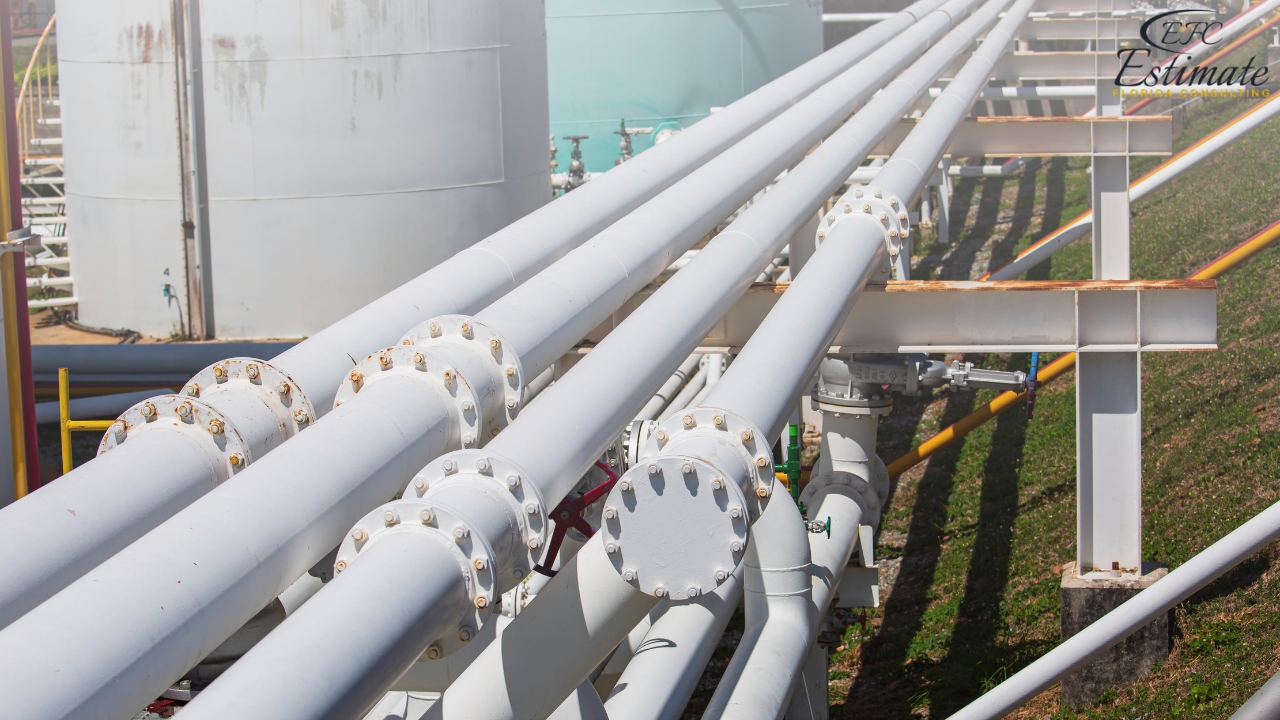
Plumbing Stack Replacement
The cost to replace a plumbing stack ranges from $1,800 to $4,800, influenced by its length and accessibility. Older stacks made of brass, cast iron, or steel can last up to 100 years, while modern PVC stacks last 30 to 40 years. Replacing stacks in older homes often requires navigating tight spaces and outdated systems, which can increase labor costs.
Well Pump Replacement
Replacing a well pump costs an average of $1,800, while repairs are about $960. Costs vary based on the type of pump, such as jet, submersible, solar, or hand pumps. Submersible pumps for deeper wells are more expensive but provide efficient water flow. Solar pumps offer long-term savings but come with higher initial costs.
Water Heater Installation
Water heater installation costs depend on the type of unit you choose. Here’s a breakdown of average prices:
- Standard water heater: Installation costs range from $900 to $1,680, with high-efficiency models costing more but reducing energy bills over time.
- Solar water heaters: Prices range from $2,400 to $6,240, offering significant savings on energy bills in sunny climates.
- Tankless water heaters: These cost $1,200 to $2,160. Although more expensive upfront, they offer endless hot water and improved energy efficiency.
Water or Gas Holding Tanks
Replacing a holding tank costs between $1,800 and $2,880, depending on the size and type. The cost to remove an old tank adds an additional $600 to $1,620. Whether it’s for water storage or gas supply, holding tanks are vital for many homes and should be replaced promptly if signs of wear appear.
Main Water Line Installation Cost Per Foot
The main water line connects your home to your city or town’s water supply. It runs from the edge of your property to the water meter inside your home. Since the distance varies for each property, the cost is usually calculated per foot. Factors like the installation method, type of materials used, and soil conditions can significantly impact the price. On average, installing a main water line costs between $85 and $2,450 per foot, with most homeowners paying $120 to $230 per foot. If your house is located farther from the road, the total cost will naturally increase.
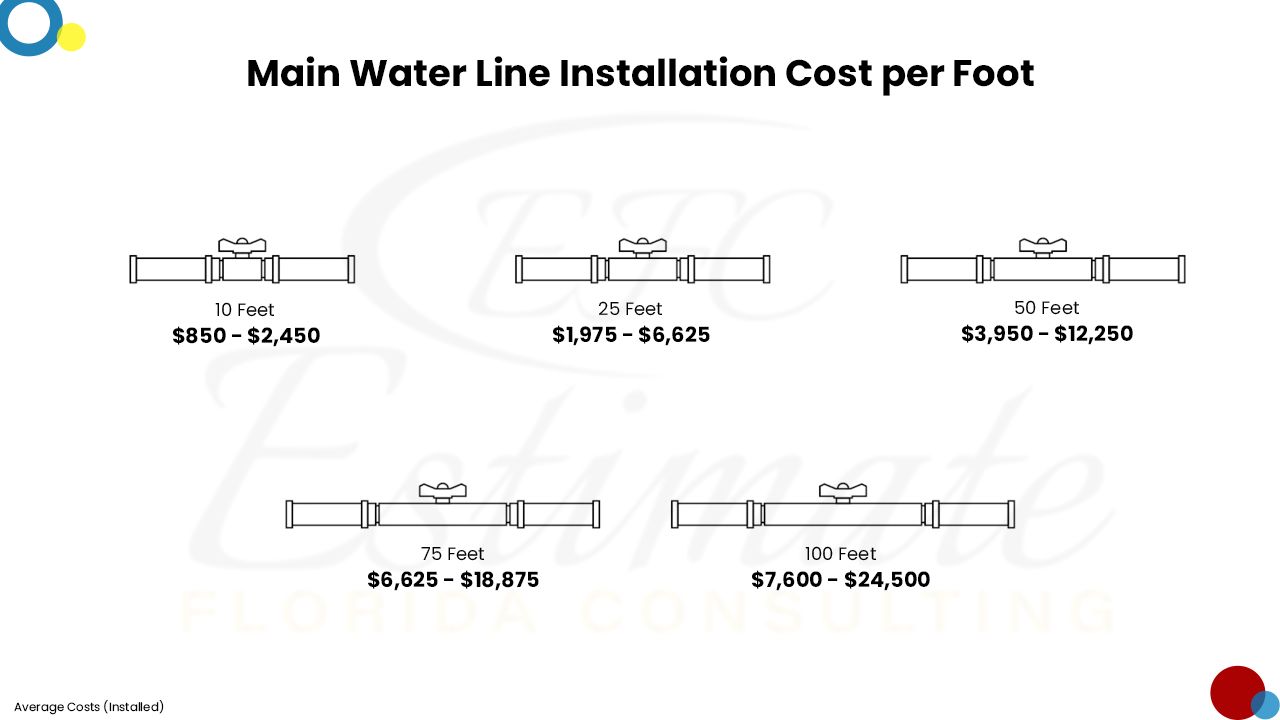
Here’s a breakdown of average costs based on the length of the water line:
Main Line Length | Average Costs (Installed) |
10 Feet | $850 – $2,450 |
25 Feet | $1,975 – $6,625 |
50 Feet | $3,950 – $12,250 |
75 Feet | $6,625 – $18,875 |
100 Feet | $7,600 – $24,500 |
Rough-In Plumbing Costs for New Construction
The cost of rough-in plumbing for a new home typically ranges from $10,000 to $15,000 for a 2,000-square-foot house with 2 or 3 bathrooms. This phase involves installing all the necessary pipes connected to the water supply and drainage system but does not include installing sinks, faucets, or toilets.
Once you add fixtures like bathtubs, sinks, dishwashers, and toilets, the costs can range from $550 to $2,100 per fixture or about $5,000 for all fixtures combined.
The total cost for both rough-in plumbing and fixture installation generally falls between $15,000 and $22,000. The term “rough-in plumbing” refers to setting up the main piping infrastructure, while adding the final fixtures completes the system and increases the overall expense.
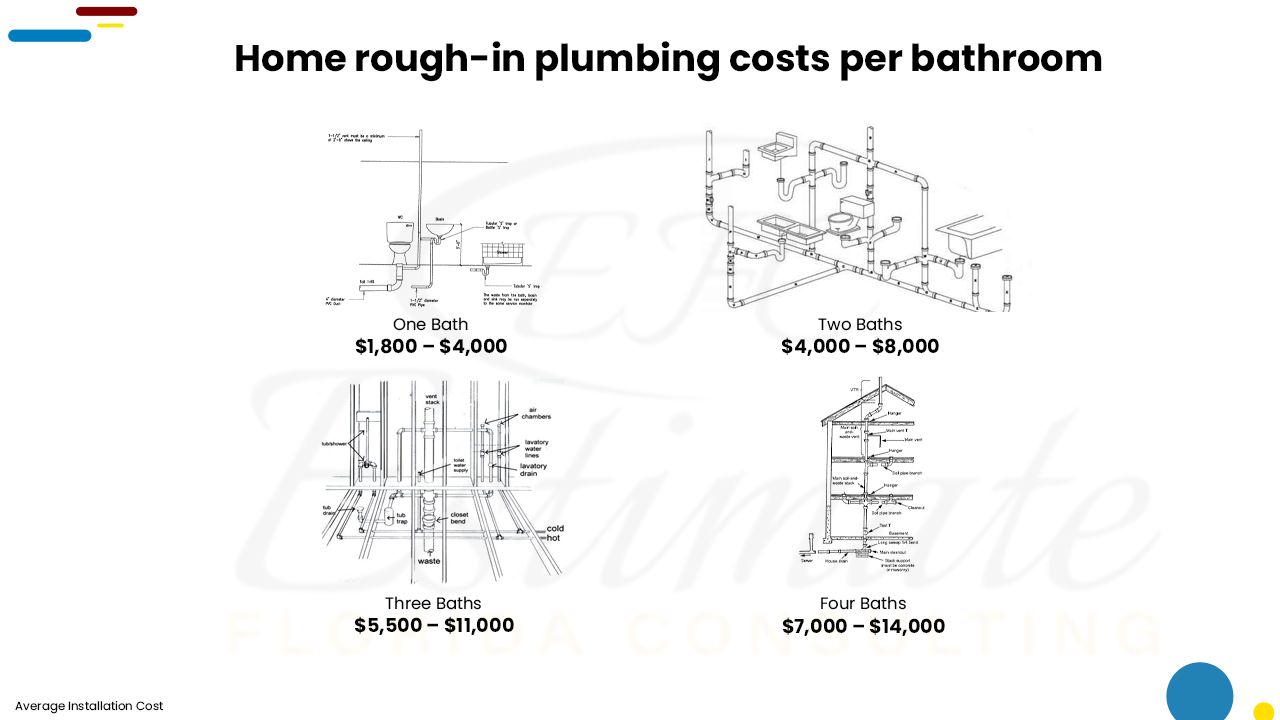
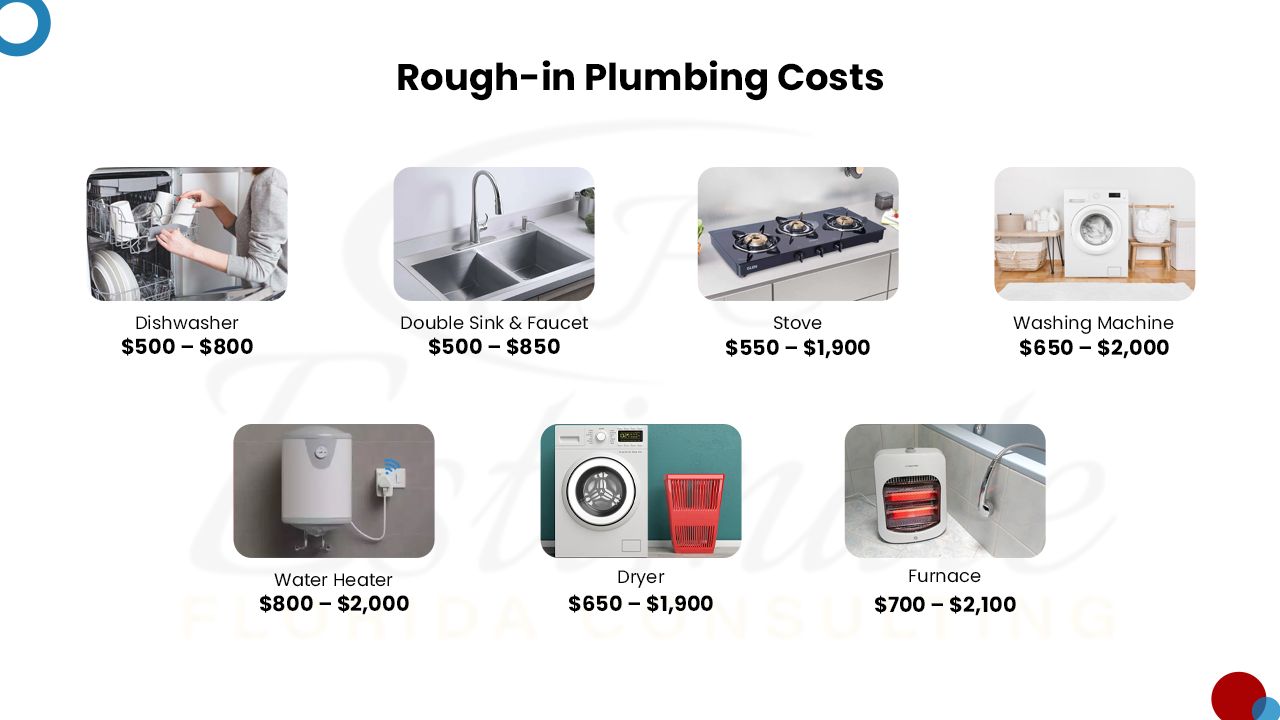
New Plumbing Pipe & Materials Costs
When installing new pipes in your home, whether it’s for a renovation or a new build, you’ll generally choose from three common options that meet building codes: copper, PEX, and CPVC (chlorinated polyvinyl chloride). Copper is durable and long-lasting but more expensive, while PEX and CPVC are affordable plastic-based alternatives that are easier to install and still highly effective.
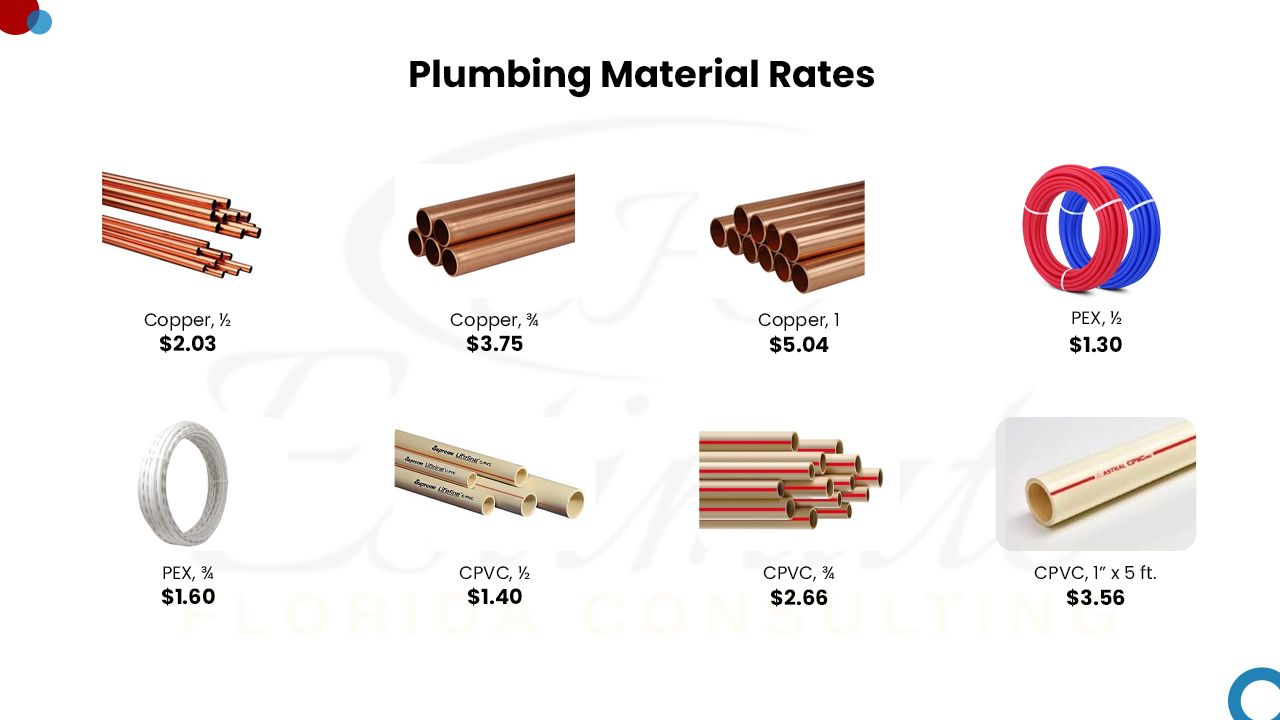
Here’s a quick overview of plumbing material costs per linear foot:
Material | Price Per Linear Foot |
Copper, ½” | $2.03 |
Copper, ¾” | $3.75 |
Copper, 1” | $5.04 |
PEX, ½” | $1.30 |
PEX, ¾” | $1.60 |
CPVC, ½” | $1.40 |
CPVC, ¾” | $2.66 |
CPVC, 1” (5 ft.) | $3.56 |
Affordable plumbing installation in Port Charlotte are just a call away. Contact us now!
Bathtub Costs by Type
The price of a bathtub can range widely, from $400 to $23,000, depending on the type you choose. Bathtubs come in various shapes, sizes, and installation styles, making it easy to find one that fits your needs and home design. Some can be installed as freestanding tubs, built into a deck, or combined with a shower enclosure. The type of tub you select not only impacts the cost but also determines the installation method.
With so many options available, you’re sure to find a bathtub that matches your style and budget. Below is a breakdown of the most common bathtub types, their costs, and key details to consider:
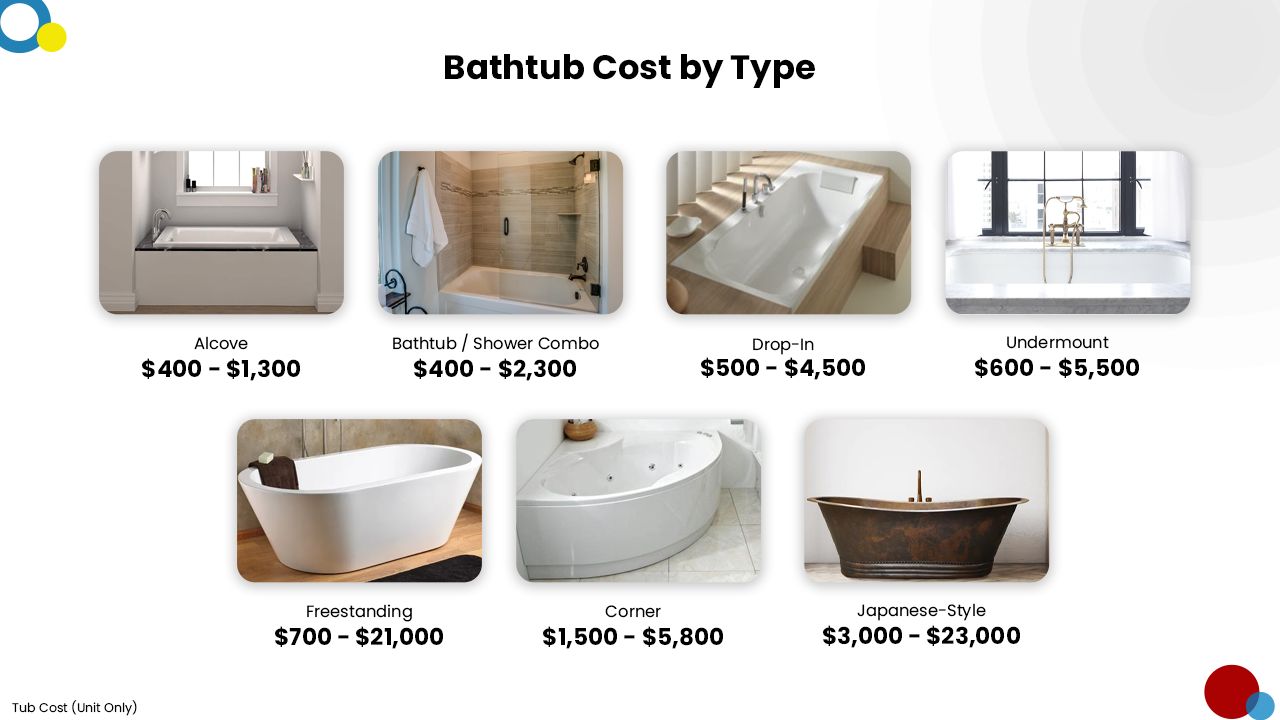
Type | Tub Cost (Unit Only) |
Alcove | $400 – $1,300 |
Bathtub/Shower Combo | $400 – $2,300 |
Drop-In | $500 – $4,500 |
Undermount | $600 – $5,500 |
Freestanding | $700 – $21,000 |
Corner | $1,500 – $5,800 |
Japanese-Style | $3,000 – $23,000 |
Cost to Run a Gas Line by Project
The cost of running a gas line can vary depending on several factors, such as where you live, the type of appliance, the length of the line, and the installation process itself. Typically, a plumber connects the gas pipe from your meter to your appliances, while the utility company handles the line installation from the street to your home. Since both have separate charges, it’s essential to coordinate their work for a smooth installation.
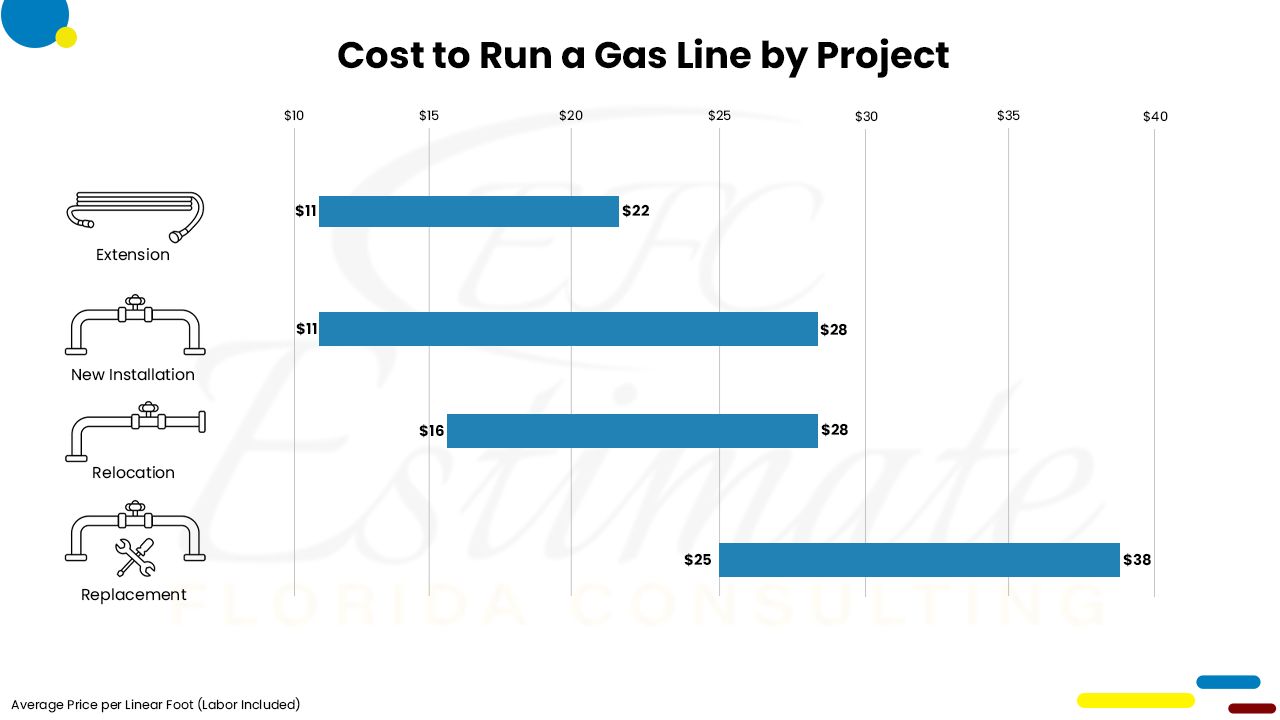
Within your home, different types of gas line installations can affect the overall cost of the project. Here’s a breakdown of average costs per linear foot, including labor:
Project Type | Average Cost per Linear Foot (Labor Included) |
Extension | $11 – $22 |
New Installation | $11 – $28 |
Relocation | $16 – $28 |
Replacement | $25 – $38 |
Rerouting Plumbing Prices
Rerouting plumbing involves altering the path of existing pipes to accommodate renovations, repairs, or layout changes. The cost to reroute a single line averages between $780 and $1,800, but this doesn’t include additional expenses like drywall removal, framing, or the cost of repairing walls and floors after the work is done. Several factors influence the cost, including the length of the pipe, the type of material used, and the accessibility of the existing line. For example, rerouting a pipe under a concrete slab is significantly more labor-intensive and expensive compared to a pipe in a crawlspace, basement, or wall. To get an accurate estimate, it’s essential to obtain quotes from multiple licensed plumbers, as each project presents unique challenges.
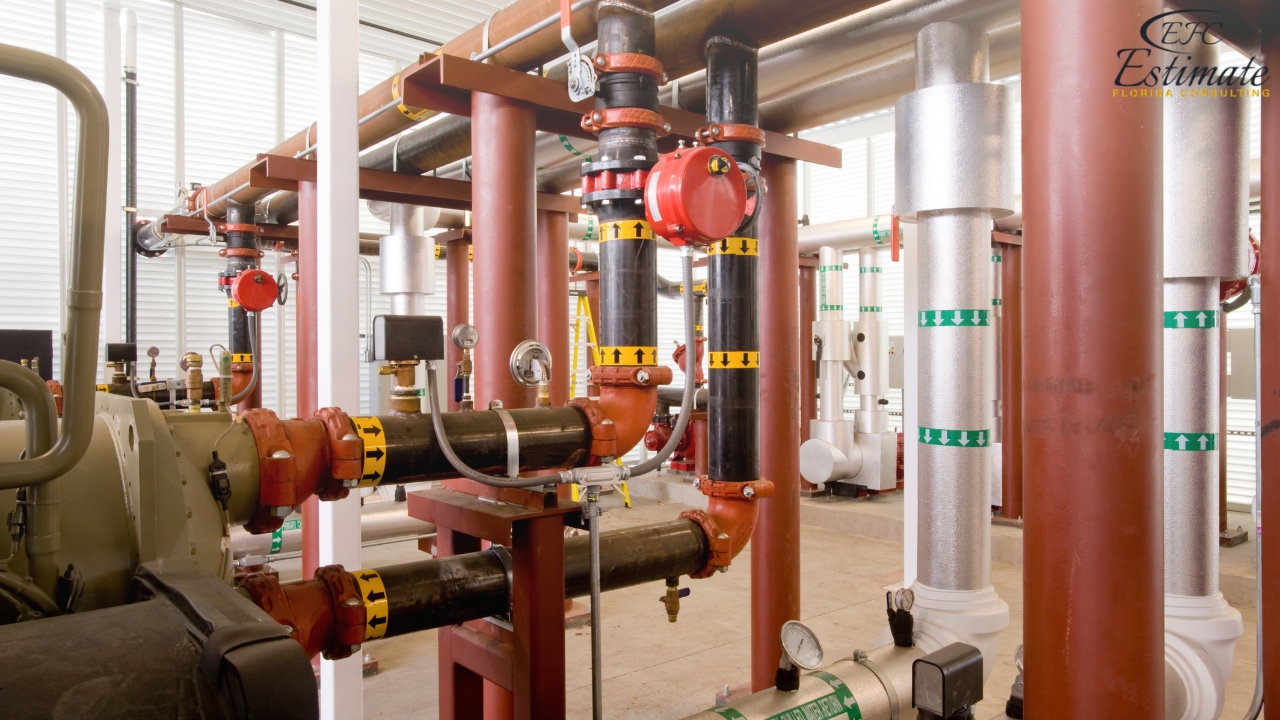
Whole House Rough-In Plumbing Cost
Installing rough-in plumbing for a new home or major renovation project is a substantial expense. For a typical 2,300-square-foot home with 2.5 bathrooms, rough-in plumbing starts at $13,800 and can go much higher depending on the type of piping used. Common materials include PEX, CPVC, and copper, each with varying price points and durability. PEX is often the most affordable and flexible, while copper offers long-term reliability but at a premium cost. This type of work requires experienced plumbing contractors who specialize in large-scale projects like new constructions or home remodels. If you’re planning a project of this scale, consult a reputable contractor to compare piping options and get a customized quote that accounts for your home’s specific layout and water system needs.
Plumbing Inspection Charges
A plumbing inspection is a valuable step for homeowners to identify issues before they escalate into costly repairs. The average cost of a standalone plumbing inspection is around $200, though prices can vary depending on your location. In some cases, inspections are bundled with general home inspection services, which range from $300 to $600. While a plumbing inspection isn’t mandatory when purchasing a home, it’s a worthwhile investment for peace of mind. Inspectors check for common problems like leaks, water pressure issues, and outdated piping materials, ensuring the plumbing system is safe and functional. For older homes or properties with visible signs of wear, scheduling a thorough inspection can save you thousands in potential repairs down the line. Always hire a certified plumbing inspector for a reliable evaluation of your home’s plumbing system.
Tips to Save on Plumbing Costs and Get Quality Service
Saving money on plumbing repairs doesn’t mean cutting corners. Hiring a licensed and experienced plumber ensures you get high-quality, insured work that prevents expensive problems down the road. By following these tips, you can find a reliable plumber, stick to your budget, and avoid unnecessary future repairs.
Plan Ahead to Avoid Emergency Costs
The best time to search for a plumber isn’t when your kitchen sink has turned into Niagara Falls. Emergency situations often lead to rushed decisions and higher costs, especially during holidays or after-hours. Planning ahead by researching plumbers and keeping their contact information handy can save you time, stress, and money.
Get Written Estimates and Clear Communication
Always request a written estimate before the plumber starts work. A firm estimate ensures you understand what’s included and prevents surprise charges. Ask about potential problems that might arise and how they could impact costs. Licensed plumbers are typically transparent about pricing and will discuss options with you.
Understand Cost Factors
Several factors influence plumbing costs, including the quality and number of fixtures, job complexity, time required, and your location. On average, weekends, or late hours. For example, a repair that costs $180 during normal hours may rise to $216 after-hours. Be prepared to pay extra for emergencies but balance urgency with practicality.
Watch Out for First-Hour and Trip Fees
Many plumbers charge a first-hour fee or trip fee, which can range from $100 to $300, just for showing up. These fees are often rolled into the total cost of repairs, but it’s essential to confirm this with your plumber upfront. If you’re unsure, ask for a detailed breakdown of the charges to avoid misunderstandings.
Avoid the Pitfalls of Lowest Bids
Going with the lowest bid may seem like a good idea, but it can backfire. Some companies offer low hourly rates only to tack on hidden fees for equipment or supplies. For instance, while a plumber may advertise a rate of $60 per hour, additional fees for tools or materials could push the final bill over $300. Prioritize value and transparency over the cheapest rate.
Ensure Your Plumber is Licensed
Not all companies employ licensed plumbers. While an unlicensed technician may suffice for simple tasks like clearing a clog, licensed plumbers are better equipped to handle complex jobs. They use advanced tools like micro-cameras to diagnose issues and often provide warranties for their work. Paying 20% more for a licensed plumber, such as $240 instead of $200, can save you thousands in future repairs.
Consolidate Plumbing Jobs to Save Money
Bundling multiple small repairs can significantly reduce costs. For example, if you’ve been dealing with a leaky faucet, ask your plumber to address it while fixing your toilet. Combining tasks can save on labor costs and trip fees. A single visit that might cost $400 for two separate repairs could be reduced to $320 by consolidating the work.
Download Template For Plumbing Project Breakdown
- Materials list updated to the zip code
- Fast delivery
- Data base of general contractors and sub-contractors
- Local estimators

Understand Plumbing Basics
While estimating a plumbing job should be left to professionals, learning basic plumbing concepts can help you spot potential issues before they escalate. For example, recognizing early signs of a slow drain or a dripping faucet allows you to address problems before they require extensive and costly repairs. Additionally, understanding plumbing basics helps you better communicate with your plumber, ensuring a smoother process and more accurate estimates.
Frequently Asked Question
To calculate the cost of plumbing, you need to consider several factors, including the type of plumbing work required (repair, installation, or maintenance), the materials needed (pipes, fittings, etc.), labor costs, and any permits or additional fees. A detailed estimate should include the cost of labor (usually hourly or flat rate), the materials required, and any overhead costs. It’s also important to include the cost of any unforeseen issues that may arise during the project.
Most plumbers charge an hourly rate, which typically ranges from $45 to $200 per hour, depending on the complexity of the job and the region. In general, plumbers in urban areas or for specialized services tend to charge higher rates. You may also encounter a flat rate for specific plumbing services, such as drain cleaning or water heater installation.
Repiping a 1500 square foot house can cost anywhere from $3,000 to $8,000 or more, depending on the materials used (copper, PEX, etc.), the complexity of the layout, and the region. Factors like accessibility, the age of the home, and the number of fixtures will also influence the total cost. Be sure to get a detailed estimate that includes labor, materials, and any potential complications.
To make a plumbing estimate, start by assessing the scope of the project. List all the necessary materials, tools, and fixtures required. Then, calculate the labor cost based on the estimated time the job will take, considering the plumber’s hourly rate. Include any additional fees such as permits, disposal, or equipment rental. It’s important to factor in potential contingencies for unexpected issues.
A plumbing quote should include a detailed breakdown of costs, including labor, materials, and any additional services such as permits or disposal. It should also specify the type of work being done (installation, repair, or maintenance), estimated project duration, and warranty information. The quote should clearly define the payment terms and any potential additional costs that may arise.
To calculate the minimum number of plumbing fixtures, you must follow local plumbing codes, which typically outline the minimum fixture requirements based on the size of the home and the number of occupants. Common fixtures include sinks, toilets, bathtubs, showers, and laundry connections. The plumbing code will provide guidelines on how many of these fixtures are required based on your home’s size and use.
A 2-inch drain pipe can typically handle up to 1-2 bathroom fixtures, such as a sink, toilet, or shower, depending on the design and flow rate. The capacity can vary based on the type of fixtures and the layout of the plumbing system. Always refer to local plumbing codes to ensure compliance with drainage requirements for your specific project.
Total fall in plumbing refers to the slope required for proper drainage of pipes. For waste pipes, a typical fall is 1/4 inch per foot of pipe. To calculate total fall, measure the length of the drain pipe and multiply by the required slope. For example, if a drain pipe is 10 feet long, the total fall would be 10 feet x 1/4 inch = 2.5 inches.
Comprehensive Trade-Specific Estimates
At Estimate Florida Consulting, we offer detailed cost estimates across all major trades, ensuring no part of your project is overlooked. From the foundation to the finishing touches, our trade-specific estimates provide you with a complete and accurate breakdown of costs for any type of construction project.

Testimonials
What Our Clients Say
We take pride in delivering accurate, timely, and reliable estimates that help contractors and builders win more projects. Our clients consistently praise our attention to detail, fast turnaround times, and the positive impact our estimates have on their businesses.
Estimate Florida Consulting has helped us win more bids with their fast and accurate estimates. We trust them for every project!

Steps to Follow
Our Simple Process to Get Your Estimate
01
Upload Plans
Submit your project plans, blueprints, or relevant documents through our online form or via email.
02
Receive Quotation
We’ll review your project details and send you a quote based on your scope and requirements.
03
Confirmation
Confirm the details and finalize any adjustments to ensure the estimate meets your project needs.
04
Get Estimate
Receive your detailed, trade-specific estimate within 1-2 business days, ready for your project execution.





